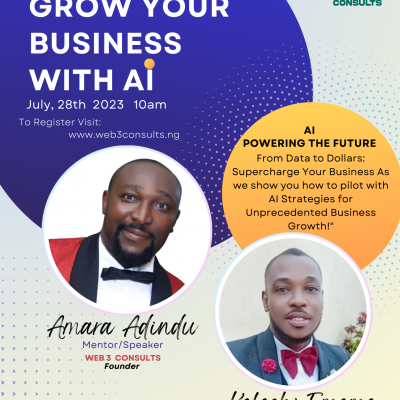AI is not a monster; the real threat is having the tool but not knowing how to use it. That said, let's take a look at how you can leverage AI to drive business growth and innovation.
It's no longer news that artificial intelligence (AI) is crawling into the cracks of every business process in multiple industries. Many think it might cause serious disruption and chaos, especially for employees. Nonetheless, AI is anticipated to increase at an average yearly pace of 37.3% from 2023 to 2030, per Grand View Research. Since individuals and businesses are optimistic about using it in their everyday lives, it's safe to say that it has its perks.
- How can AI help in content marketing? AI helps you understand your audience based on collected data, and allows you to create and target personalized, dedicated pages for them. Personalized landing pages answer visitors' questions through the landing page elements. They're then more likely to click a call-to-action button and fulfill your conversion goal.
- How does AI promote business growth? AI-driven personalized marketing campaigns can help build stronger connections with customers and increase brand loyalty. Additionally, AI-powered content creation tools can streamline the content creation process, saving businesses time and money.
- What is the AI-driven marketing approach? AI marketing is able to conduct tactical data analysis faster than its human counterparts and use machine learning to come to fast conclusions based on campaign and customer context. This gives team members time to focus on strategic initiatives that can then inform AI-enabled campaigns.
How AI will power the future of successful content marketing? For example, AI can help content marketers to better understand their target audience by analyzing data on customer demographics, interests, and online behaviors. This information can be used to create more targeted and effective content marketing campaigns.
· How to use AI for content strategy?
Here are 8 different ways you can add AI to your content strategy creation process.
1. Research content topics:
AI analyzes search engine data and social media trends to spot relevant topics that appeal to your target audience.
By providing AI with a description of your buyer persona and their needs, it can brainstorm dozens of topics in a matter of seconds. Pick and choose those that best match your content strategy and add them to your editorial calendar.
2. Optimize your content:
You can use AI to research SEO keywords and metadata based on your content topics. Take it up a notch further by asking the AI to write meta titles, headlines, and meta descriptions for you—even if the AI doesn’t strike gold, you can riff off what it generates.
AI can also analyze content performance data. By using AI to aggregate your analytics and pull out key insights, you’ll likely save yourself hours of work digging through the numbers on your own.
3. Create content:
Use AI to write content outlines, headlines, and even articles. By using machine learning algorithms and natural language processing, AI can easily create even a full blog post in under five minutes. (Just be sure to edit and add your human touch to any AI-written content to avoid potential issues like Google flagging your content.)
4. Curate content:
Some AI tools specialize in curating relevant content from sources across the internet. This is helpful if you use content curation to share relevant information and thought leadership pieces your target audience might enjoy.
5. Personalize your Content:
AI has access to huge amounts of online data, and that can include information about your target audience and current customers. By analyzing data like demographics, browsing preferences, needs, and interests, AI can recommend different methods and strategies for personalizing your content.
6. Distribute content:
You can use AI’s analytics power to pinpoint the best days of the week and best times to distribute your content. Better yet, you can use AI to analyze engagement across all your distribution channels to spot trends and the best channels to post to for maximum reach and impact.
7. A/B test your content:
A/B testing allows you to test different designs, page structure, and even copy to see what resonates best with your audience. Use AI to brainstorm and generate variations to test—or use it to analyze the results and discover insights.
8. Engage customers with chatbots:
Chatbots are an easy way to engage with your customers and assist them with problems in real time. Rather than having your audience sift through forum posts or how-to guides, a chatbot can analyze a question and deliver an appropriate response.
· Research
By utilizing AI's data-driven methodology, businesses can explore enormous informational databases, identify new patterns and gain priceless insights that will spark innovation and propel their company to the top of their respective industries.
· Automation
AI has changed the game for business owners striving to maintain their competitiveness. Routine processes can easily be streamlined with AI automation, giving you and your team more time to concentrate on strategic and creative projects. By utilizing AI, specifically for automation, you can eliminate tedious chores and innovate while increasing productivity.
·Pricing
Though not highly mentioned, AI can assist companies with the costs they attach to their products and services. Business owners, especially start-ups, normally struggle with this aspect of business, but AI-driven dynamic pricing algorithms are capable of making automatic adjustments to prices based on current market demand, competitor pricing, etc. Companies can utilize this tool to maximize profits, keep up with the competition and optimize pricing tactics.
· Cybersecurity
Organizations can also leverage AI to improve cybersecurity — an increasingly important area for modern businesses. With AI, companies are capable of easily spotting dangerous tendencies, fending against cyberattacks and bolstering their online fortifications to protect the integrity and security of their sensitive data.
· Decision-making
The days of depending entirely on intuition and educated guesses are over; AI enables business owners to make decisions that are supported by in-depth study and analysis. The technology is able to offer invaluable insights, analyze vast quantities of data and spot nuanced patterns. As a result, businesses can make informed, strategic decisions that confidently and precisely advance their company.
· Risk management
Companies can utilize AI to stay one step ahead by spotting anomalies and fraudulent activities and evaluating large databases for potential threats. With AI acting as their watchful protector, they can actively manage risks, protect their priceless assets and successfully negotiate volatile business environments.
· Customer experience
Data from Semrush states that 40% of businesses use AI primarily to improve customer experiences. This is due to AI's ability to assist any organization in effortlessly satisfying consumer needs, quickly addressing inquiries and providing individualized experiences with chatbots and customized interactions.



